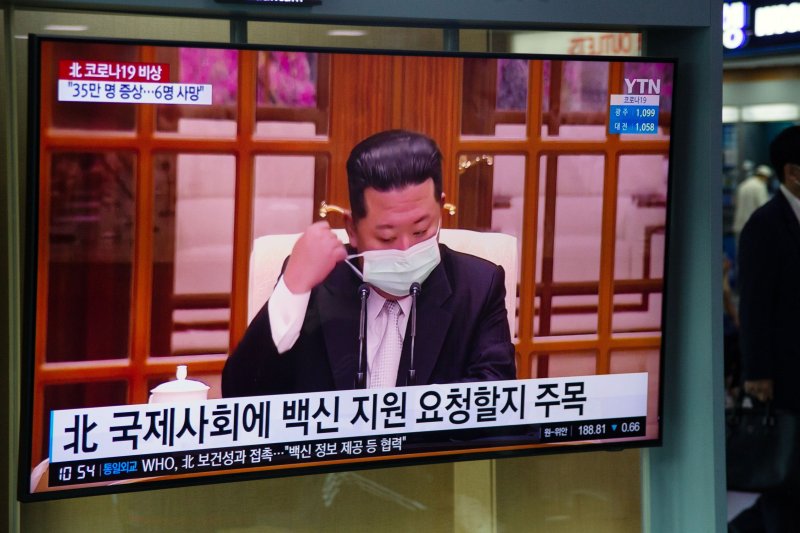1 of 2 | North Korean leader Kim Jong Un is seen on Friday in a news broadcast about his country's COVID-19 outbreak, at a station in Seoul. Photo by Jeon Heon-Kyun/EPA-EFE
SEOUL, May 13 (UPI) -- COVID-19 has been spreading "explosively" in North Korea since last month and has caused six deaths, state media reported Friday, a day after the isolated country announced its first cases of the disease and imposed a nationwide lockdown.
"A fever whose cause couldn't be identified explosively spread nationwide from late April," Korean Central News Agency reported, with more than 350,000 people infected.
"On May 12 alone, some 18,000 persons with fever occurred nationwide and as of now up to 187,800 people are being isolated and treated," the report said. Six people have died, with one of them testing positive for the BA.2 subvariant of the highly contagious Omicron.
North Korean leader Kim Jong Un visited the country's disease control headquarters Friday and criticized health officials there, saying that the "simultaneous spread of fever with the capital area as a center shows that there is a vulnerable point in the epidemic prevention system," KCNA reported.
While the origin of the outbreak remains unclear, North Korea held a major military parade with tens of thousands of unmasked participants and spectators in the capital city of Pyongyang on April 25.
North Korea had not reported any COVID-19 infections since the beginning of the pandemic until Thursday, when Kim helmed a meeting of politburo officials and announced that the country was moving into "maximum emergency epidemic prevention" mode.
Pyongyang has repeatedly rejected offers of vaccines from China, Russia and the COVAX global vaccine sharing program, and observers warn that the country is unequipped to handle a COVID-19 outbreak.
"Most North Koreans are chronically malnourished and unvaccinated, there are barely any medicines left in the country, and the health infrastructure is incapable to deal with this pandemic," said Lina Yoon, senior Korea researcher at Human Rights Watch. "The international community should offer medicine for COVID-19-related symptoms, COVID-19 treating antiviral medicines and provide vaccines and all necessary infrastructure for vaccine preservation, including fridges, generators and gasoline."
The United States said Thursday it had no plans to share vaccines from its own supply with North Korea.
However, Washington would "support international efforts aimed at the provision of critical humanitarian aid to the most vulnerable North Koreans," White House spokeswoman Jen Psaki said at a press briefing on Thursday.
She criticized Pyongyang for refusing vaccines from COVAX, saying it was a "broader part of the DPRK continuing to exploit its own citizens." The Democratic Republic of Korea is the official name of North Korea.
"It's not just vaccines," Psaki said. "It's also a range of humanitarian assistance that could very much help the people in the country, and instead they divert resources to build their unlawful nuclear and ballistic missiles programs."
Just hours after announcing its first COVID-19 cases Thursday, North Korea fired three short-range ballistic missiles, according to South Korea's military. The launch was Pyongyang's 16th weapons test of the year, and officials in Washington and Seoul have said for several weeks that they are on alert for a nuclear weapons detonation.
Psaki said Thursday the United States has assessed North Korea "could be ready to conduct a [nuclear] test there as early as this month."
U.S. President Joe Biden is scheduled to visit South Korea and meet with newly inaugurated President Yoon Suk-yeol on May 21.















